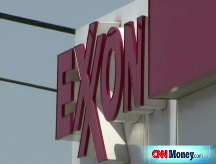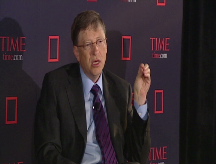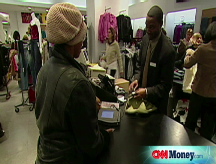Stocks take a tumble
Signs that the economy remains weak make investors wary, with the Dow losing more than 200 points.



NEW YORK (CNNMoney.com) -- Wall Street's losses accelerated at the end of the day Thursday as investors fretted about the labor market and a reading on the economy's growth that was less positive than forecast.
Losses on the tech-heavy Nasdaq were limited by Motorola earnings that were better than expected and by promising biotech news.
The Dow Jones industrial average (INDU) ended the day down 206 points, or 1.8% lower, while the broader Standard & Poor's 500 index (SPX) finished 1.3% lower. The tech-heavy Nasdaq composite index (COMP) slid 0.2% after holding onto modest gains throughout the day.
One analyst said investors acted ahead of what is expected to be a grim July unemployment report on Friday.
"The surge in jobless claims gave investors a perfect excuse to take money off the table ahead of the major report of the month, which is employment," said Peter Cardillo, chief market economist at Avalon Partners.
The U.S. Department of Labor is expected to report that unemployment ticked up to 5.6% from 5.5% in the month prior, according to a consensus estimate of economists from Briefing.com. A job loss of 75,000 is forecast, which would mark the seventh straight month of declines.
A government report on Thursday that showed the economy grew at a slower-than-expected pace in the second quarter hurt market sentiment, as did a surge in initial jobless claims.
All three major indexes opened sharply lower before turning mixed as investors digested the news.
"The economic data that came in this morning was clearly disappointing," said Art Hogan, chief market strategist at Jefferies & Co.
"The main focus of market today is the GDP report that was weaker than expected," said Ed Clissold, senior global analyst with Ned Davis Research. "With the stimulus checks mostly going through the economy, what is it going to do once those dissipate?"
The market weakness came on the heels of a big two-day rally for stocks. The 30-component Dow gained "452 points in 2 days, so it is not surprising to get any sort of a pullback," said Hogan.
Market breadth was negative. On the New York Stock exchange, decliners beat advancers by nearly 2 to 1 on volume of 1.5 billion shares. On the Nasdaq, decliners just beat out advancers 15 to 13 on volume of 2.4 billion shares.
Economic reports: The Commerce Department reported that GDP grew at an annual rate of 1.9% in the three months ended June 30, up from a revised first-quarter growth rate of 0.9%. While that showed an increase, it was lower than the 2.3% forecast by economists. GDP for the fourth quarter of 2007 was revised down, to a decline of 0.2%. (Full story.)
The Labor Department said initial filings for unemployment benefits rose to a five-year high. Jobless claims increased by a seasonally adjusted 44,000 to 448,000 in the week ended July 26, much higher than the 395,000 that was expected in a consensus estimate of economists polled by Briefing.com. (Full story.)
The surge in jobless claims may have shocked the market even more than the slightly lower-than-expected GDP number, said one analyst.
"What caused the market to drop this morning was the jobless claims," said Harry Clark, founder and chief executive officer of Clark Capital Management Group. "There is always a knee-jerk reaction when you get news like that," he added.
Tech boost: The tech-heavy Nasdaq recouped earlier losses, boosted by better-than-expected results from tech-giant Motorola and news in the biotech sector.
Motorola (MOT, Fortune 500) swung to a profit, earning 2 cents a share, in the second quarter. That was much better than the 3-cents-per-share loss estimated by analysts. (Full story.) Shares ended the day almost 13% higher.
The strong results were enough to support a broader tech rally for most of the session.
"Nasdaq is so tech-laden and there are so many things that go into cell phones from chip sets to packaging," explained Jefferies' Hogan. "If you get better news out of Motorola, you get better news out of tech."
In the biotech sector, drug developer Bristol-Myers Squibb (BMY, Fortune 500) offered $4.5 billion for the remaining 83% stake it doesn't already own in its partner in making cancer drugs, ImClone Systems (IMCL). (Full story.) Bristol-Myers' stock, which trades on the New York Stock Exchange, edged down almost 2% by the end of the day, while Nasdaq component ImClone saw shares surge nearly 38% on the news.
"Motorola is helping the tech stocks and Bristol-Myers [buying ImClone] is helping the biotech, and those are both heavy parts of Nasdaq," said Clark.
The AMEX Biotech index, of which ImClone is a component, was up more than 4% Thursday afternoon.
Other Dow components that made significant market moves Thursday included Caterpillar (CAT, Fortune 500), which lost more than 3.5%; Walt Disney (DIS, Fortune 500), which finished for the day down more than 4%; and Boeing (BA, Fortune 500), which more than 4%.
Energy and Exxon Mobil: Before the opening bell, Dow component Exxon Mobil reported a record profit that, nonetheless, fell short of forecasts. That dampened the mood and dragged the Dow lower.
Exxon reported net income of $11.68 billion on revenue of $138 billion. Analysts were looking for a profit of $12.1 billion on sales of $144.4 billion. (Full story.) Exxon (XOM, Fortune 500)'s stock was down almost 5%.
Light, sweet crude oil for September delivery fell $2.69 to settle at $124.08 on the New York Mercantile Exchange. Oil prices surged more than $4 Wednesday, after having fallen sharply in recent weeks from a record high of $147.27 set earlier in the month. The Wednesday rally followed a government report showing that U.S. stockpiles of gasoline fell unexpectedly in the latest week.
At least one analyst suggested that the inverse relationship between oil prices and the stock market is beginning to weaken. Clark noted that the spike in oil prices on Wednesday did not hinder Wall Street - the Dow actually gained 186 points.
"We all realize we have to find more oil, more energy, more alternative sources of energy," said Clark. "Oil is starting to take more than a back seat than it has in the past."
Retail gas prices fell for the 14th day in a row, according to a daily survey by the motorist advocacy group AAA. The nationwide average price of regular unleaded gas fell 1.7 cents to $3.909 a gallon on Thursday. (Full story.)
Other markets: In currency trading, the dollar lost ground against both the 15-nation euro and the Japanese yen.
COMEX gold for December delivery rose $10.40 to $922.70.
Treasury prices rallied, sending the yield on the benchmark 10-year note lower to 3.95%. Bond prices and yields move in opposite directions. ![]()






